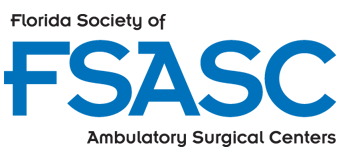Accreditation
Two nationally recognized accrediting agencies — Accreditation Association for Ambulatory Health Care (AAAHC) and the Joint Commission on Accreditation of Healthcare Organizations (JCAHO) — have been granted deemed status with the Agency for Health Care Administration (AHCA) and the Health Care Financing Administration (HCFA) which administers the Medicare program. Deemed status means that AHCA and HCFA have determined that the accrediting agencies provide, at the minimum, a similar inspection to that conducted for State Licensure and Medicare Certification. Accredited surgical centers can release the accreditation survey findings to AHCA and, if found to be in substantial compliance with standards, the AHCA and Medicare survey can be waived. All facilities are subject to Life Safety inspections unless the survey team from AAAHC or JCAHO included a Florida licensed life safety inspector. A small percentage of accredited centers will receive unannounced validation inspections. Accrediting agencies will look for consistent Continuous Quality Improvement within the facility and organization-wide. The commitment to Quality must extend from the leaders throughout the organization. Participation in Quality Improvement activities, including educational opportunities, are essential for a successful accreditation survey. AAAHC was incorporated in 1979 to organize and operate a peer-based assessment, education, and accreditation program for ambulatory health care organizations. Many outpatient health care provider organizations support and sponsor AAAHC including the American College Health Association, the Federated Ambulatory Surgery Association, the Medical Group Management Association, and the National Association of Community Health Centers, the Outpatient Ophthalmic Surgery Society, the American Academy of Facial Plastic and Reconstructive Surgery, the American Society of Outpatient Surgeons, the American College of Occupational and Environmental Medicine, the American Academy of Dental Group Practice, the American Association of Oral and Maxillofacial Surgeons, the American Academy of Cosmetic Surgery, the American Society for Dermatologic Surgery, and the Association of Freestanding Radiation Oncology Centers. JCAHO, founded in 1951, began an accreditation program for outpatient surgery centers in 1975. Major supporters of JCAHO continue to include the American Hospital Association, the American Medical Association, the American College of Physicians, the American College of Surgeons, and the American Dental Association. Internet Access: The Internet provides access to accrediting agencies and can provide information about which facilities are accredited, current areas of focus, educational programs offered by the agencies, and publications available to help learn more about the accreditation process and performance improvement. The Internet addresses are:
Recent Focus by Surveyors The comprehensive integration of performance improvement (formerly called quality improvement) into all components of a surgery center is reviewed to evaluate the communication among staff, evaluation of all areas of patient care and business operations, and education relevant to the services provided by the facility. Early or Provisional Survey Both AAAHC and JCAHO now provide a choice of an Early or Provisional Survey. You can elect to have an accreditation survey at or near the opening of the facility with a return of the surveyors in six months for a complete survey. It is less expensive to wait for the complete survey to occur at least six months after opening, since the cost of the surveyor’s time and travel for the return visit is an additional expense. However, some insurers will not contract with a provider that is not accredited, so the decision to wait for accreditation may not be right for your market. You can also elect to have the AAAHC or JCAHO provide your Medicare Certification survey at the time of opening, but this requires that the accrediting agency come unannounced. With all the other tasks involved in opening a new center, a surprise visit from an accrediting agency may not the certification method of choice.
HMO market forces Accreditation has taken on greater importance for ambulatory surgical centers because of the increase in managed care and the competitive provider market. Health Maintenance Organizations (HMOs) must be accredited to continue operations in the State of Florida. And, the HMOs accrediting body, the National Committee on Quality Assurance, requires that HMOs contract with providers who are accredited. Or, the HMOs must develop strong standards and audit the providers for compliance. Patient Expectations More patients are aware of accreditation as a measure of compliance to standards. Health care providers as well as payors have stressed to consumers the importance of provider networks composed of accredited providers. And, a major health care provider has advertised its facilities outstanding accreditation survey results. This marketing tool used by some health care providers has forced others to seek accreditation to increase or maintain market share. Important Accreditation Issues Although a facility should strive to meet all accreditation standards, there are certain areas that do receive more attention during surveys. Areas currently receiving more attention include: Age-specific education, policies, procedures and competency evaluations If you treat all ages of patients in your surgery center, you should have processes specific to age groups. For example, the skin integrity, medication administration and doses, and methods to educate and provide reassurance to the patient differs with the patient’s age. Are employees trained and their performance evaluated based on the age-specific processes in the surgery center? Analysis of informationCollecting information is not enough. You must interpret the data and make decisions based on the data. Are your quality improvement activities focusing on areas that you know are important? When data indicates there is a lack of consistency in a process, are you making changes and measuring the results of those changes? CredentialingVerification of the education and training of all licensed independent practitioners (physicians, podiatrists, chiropractors, C.R.N.A., A.R.N.P.) should include original source verification of their education, training, and experience in performing the same procedures in other facilities. There are different ways to verify credentials: (1) contact the medical schools, residency programs, and hospitals yourself, (2) pay a Credentialing Verification Organization (CVO) to provide documentation of original source verification, or (3) obtain copies of original source verification from an accredited facility (such as an affiliated hospital). |
